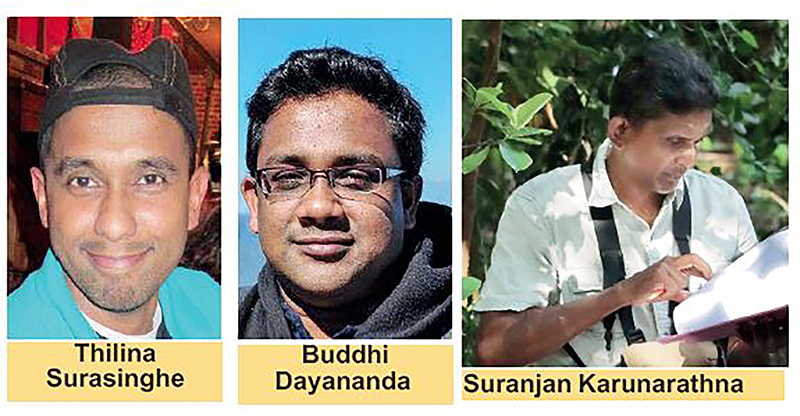Features
The recovery has begun

by Jehan Perera
Downtown Colombo and especially its upmarket commercial areas sparkled, and will continue to do so, in the night this Christmas season until the grand finale on New Year’s Eve. There is little indication that this city of night lights had experienced dire economic collapse just three years ago. The long lines of vehicles that once queued up for fuel outside petrol stations are overshadowed the much longer lines of traffic crawling on the way to the centre of celebrations at Galle Face Green, once the epicentre of the Aragalaya protests that brought down the government and had the president fleeing the country.
The hotels and nightclubs at the higher end have been packed to capacity. The cost of celebrating in them is steep but there seem to be a large number of people who can afford this expenditure, at least once in a while. New hotels such as ITC Ratnadeepa and City of Dreams overlooking water fronts create an image of Dubai at night. The ever-rising stock market is evidence for the new found confidence in the economic management of the country. There is a sense of political stability that comes not only from the 2/3 majority that the government enjoys in parliament but also from the inability of the opposition to make suggestions or proposals that are significantly different from the policies being followed by the government.
The desire to be part of the festivities was visible also in the large number of people who participate in them at different levels. They enjoyed themselves at the expensive buffets of five star hotels and in the open spaces of Galle Face Green, where there was a carnival and mobile eateries or in the big shopping malls where they might have a bite at Pizza Hut or engage in window shopping. The high costs of restaurants and consumer items relative to income are manifest in the struggle of the government to bring down the cost of living but with little success. The ongoing battle of the government with the so-called “Rice Mafia” has yielded positive results after the import of rice. But the price of coconuts remains high along with everything else that went up in price three years ago and did not come down.
SPREAD DEVELOPMENT
Outside of Colombo the Christmas celebrations were more muted if they existed at all. Christian churches were the focus of such initiatives. The big celebrations outside of Colombo would take place during the traditional Sinhala and Tamil New Year in April. Some of the provincial capitals like Jaffna had their own displays of festive lights and decorations, but they were not on the scale of Colombo. The difference in purchasing power of Colombo, the national capital, and the provincial capitals was reflected in this disparity.
One of the key justifications for the devolution of power is that there needs to be equitable development across the country and not only in the region of the capital city. Power and wealth tend to go together as those with power to decide will tend to make decisions that benefit themselves and the area they live in. The devolution of power to the provinces is to provide engines of development to the provincial capitals, ensuring wider distribution of the fruits of development. This aspect of devolution of power needs to be explained to the general population who see the concept as being a foreign-driven one meant to resolve the ethnic conflict. Devolved systems of governance have existed in Sri Lanka from the times of the kings due to the impracticalities of centralized rule.
So far the devolution of power in Sri Lanka has been seen in the context of resolving the ethnic conflict. But it can also be justified in a broader perspective as befits the “System Change” that was the main slogan of the Aragalaya protest movement that finally propelled the present government to power. The present system of devolution has been brought into operation through the 13th Amendment to the constitution which came at the height of the ethnic war in 1987 and was facilitated by the external intervention of India. It is not surprising, therefore, that the devolution of power under the 13th Amendment should be seen in that context and as having a bearing on the sovereignty and territorial integrity of the country. Its implementation has been resisted by all successive governments, including the one that brought it into law. This may account for the government’s commitment to devolve power with the passage of a new constitution, but on a different basis to that which exists at present.
CHANGED BEHAVIOURS
The progress of the economy, which is expected to grow by 4 percent this year, and higher than anticipated by international financial institutions, will be due in part to the stability in the polity, which is reflected in increased investor confidence. This positive growth factor will be supplemented by the government’s promise of non-corrupt governance. Unlike in the past, the first 100 days of the new government have not given rise to any major corruption scandal involving government leaders. The issue of the PhD degree of the Speaker of Parliament which led to the resignation of the Speaker has been a new practice when compared to the practices of the recent past. Those in power have not stepped down or been asked to step down when found out for things done which were much more detrimental to the country’s reputation and economy.
The non-ostentatious, non-extravagant and non-corrupt attitude that comes from the president and his top team appears to be seeping down to the bottom. During the holiday season a visit to the local government office to obtain a Grama Niladari certificate of local residence bore this out. The concerned officer was at his desk at the time of the visit, gave information about the application procedure and delivered the required document without any fuss or delay. He explained that he was following all the formalities including getting the signatory to sign in his presence. He explained his supervisor would be checking for this. He also volunteered the information that the change in behaviour at the top of the government was influencing those at the bottom to follow the rules in performing their duties.
Another point he made was that his area was a multi ethnic and multi religious one. The previous person he had attended to was from the Diaspora, a dual citizen, and asking for a national identity card. As that person had all the proper documentation, he had issued the relevant certificate even though he had no personal knowledge of this person who had lived abroad for the past twenty years. He said that person was a citizen and needed to be treated as an equal. In response to the query whether this too was part of the positive influence from the new government, the Grama Niladari said no, it was a message that he had picked up during the period of the Yahapalana government. The new government has inherited not only the bad but also the good from the past and is taking the good alone, to build on it in the year to come and beyond. This gives hope for the future.
Features
Making ‘Sinhala Studies’ globally relevant

 On 8 January 2026, I delivered a talk at an event at the University of Colombo marking the retirement of my longtime friend and former Professor of Sinhala, Ananda Tissa Kumara and his appointment as Emeritus Professor of Sinhala in that university. What I said has much to do with decolonising social sciences and humanities and the contributions countries like ours can make to the global discourses of knowledge in these broad disciplines. I have previously discussed these issues in this column, including in my essay, ‘Does Sri Lanka Contribute to the Global Intellectual Expansion of Social Sciences and Humanities?’ published on 29 October 2025 and ‘Can Asians Think? Towards Decolonising Social Sciences and Humanities’ published on 31 December 2025.
On 8 January 2026, I delivered a talk at an event at the University of Colombo marking the retirement of my longtime friend and former Professor of Sinhala, Ananda Tissa Kumara and his appointment as Emeritus Professor of Sinhala in that university. What I said has much to do with decolonising social sciences and humanities and the contributions countries like ours can make to the global discourses of knowledge in these broad disciplines. I have previously discussed these issues in this column, including in my essay, ‘Does Sri Lanka Contribute to the Global Intellectual Expansion of Social Sciences and Humanities?’ published on 29 October 2025 and ‘Can Asians Think? Towards Decolonising Social Sciences and Humanities’ published on 31 December 2025.
At the recent talk, I posed a question that relates directly to what I have raised earlier but drew from a specific type of knowledge scholars like Prof Ananda Tissa Kumara have produced over a lifetime about our cultural worlds. I do not refer to their published work on Sinhala, Pali and Sanskrit languages, their histories or grammars; instead, their writing on various aspects of Sinhala culture. Erudite scholars familiar with Tamil sources have written extensively on Tamil culture in this same manner, which I will not refer to here.
To elaborate, let me refer to a several essays written by Professor Tissa Kumara over the years in the Sinhala language: 1) Aspects of Sri Lankan town planning emerging from Sinhala Sandesha poetry; 2) Health practices emerging from inscriptions of the latter part of the Anuradhapura period; 3) Buddhist religious background described in inscriptions of the Kandyan period; 4) Notions of aesthetic appreciation emerging from Sigiri poetry; 5) Rituals related to Sinhala clinical procedures; 6) Customs linked to marriage taboos in Sinhala society; 7) Food habits of ancient and medieval Lankans; and 8) The decline of modern Buddhist education. All these essays by Prof. Tissa Kumara and many others like them written by others remain untranslated into English or any other global language that holds intellectual power. The only exceptions would be the handful of scholars who also wrote in English or some of their works happened to be translated into English, an example of the latter being Prof. M.B. Ariyapala’s classic, Society in Medieval Ceylon.
The question I raised during my lecture was, what does one do with this knowledge and whether it is not possible to use this kind of knowledge profitably for theory building, conceptual and methodological fine-tuning and other such essential work mostly in the domain of abstract thinking that is crucially needed for social sciences and humanities. But this is not an interest these scholars ever entertained. Except for those who wrote fictionalised accounts such as unsubstantiated stories on mythological characters like Rawana, many of these scholars amassed detailed information along with their sources. This focus on sources is evident even in the titles of many of Prof. Tissa Kumara’s work referred to earlier. Rather than focusing on theorising or theory-based interpretations, these scholars’ aim was to collect and present socio-cultural material that is inaccessible to most others in society including people like myself. Either we know very little of such material or are completely unaware of their existence. But they are important sources of our collective history indicating what we are where we have come from and need to be seen as a specific genre of research.
In this sense, people like Prof. Tissa Kumara and his predecessors are human encyclopedias. But the knowledge they produced, when situated in the context of global knowledge production in general, remains mostly as ‘raw’ information albeit crucial. The pertinent question now is what do we do with this information? They can, of course, remain as it is. My argument however is this knowledge can be a serious source for theory-building and constructing philosophy based on a deeper understanding of the histories of our country and of the region and how people in these areas have dealt with the world over time.
Most scholars in our country and elsewhere in the region believe that the theoretical and conceptual apparatuses needed for our thinking – clearly manifest in social sciences and humanities – must necessarily be imported from the ‘west.’ It is this backward assumption, but specifically in reference to Indian experiences on social theory, that Prathama Banerjee and her colleagues observe in the following words: “theory appears as a ready-made body of philosophical thought, produced in the West …” As they further note, in this situation, “the more theory-inclined among us simply pick the latest theory off-the-shelf and ‘apply’ it to our context” disregarding its provincial European or North American origin, because of the false belief “that “‘theory’ is by definition universal.” What this means is that like in India, in countries like ours too, the “relationship to theory is dependent, derivative, and often deeply alienated.”
In a somewhat similar critique in his 2000 book, Provincialising Europe: Postcolonial Thought and Historical Difference Dipesh Chakrabarty points to the limitations of Western social sciences in explaining the historical experiences of political modernity in South Asia. He attempted to renew Western and particularly European thought “from and for the margins,” and bring in diverse histories from regions that were marginalised in global knowledge production into the mainstream discourse of knowledge. In effect, this means making histories of countries like ours relevant in knowledge production.
The erroneous and blind faith in the universality of theory is evident in our country too whether it is the unquestioned embrace of modernist theories and philosophies or their postmodern versions. The heroes in this situation generally remain old white men from Marx to Foucault and many in between. This indicates the kind of unhealthy dependence local discourses of theory owe to the ‘west’ without any attempt towards generating serious thinking on our own.
In his 2002 essay, ‘Dismal State of Social Sciences in Pakistan,’ Akbar Zaidi points out how Pakistani social scientists blindly apply imported “theoretical arguments and constructs to Pakistani conditions without questioning, debating or commenting on the theory itself.” Similarly, as I noted in my 2017 essay, ‘Reclaiming Social Sciences and Humanities: Notes from South Asia,’ Sri Lankan social sciences and humanities have “not seriously engaged in recent times with the dominant theoretical constructs that currently hold sway in the more academically dominant parts of the world.” Our scholars also have not offered any serious alternate constructions of their own to the world without going crudely nativistic or exclusivist.
This situation brings me back to the kind of knowledge that scholars like Prof. Tissa Kumara have produced. Philosophy, theory or concepts generally emerge from specific historical and temporal conditions. Therefore, they are difficult to universalise or generalise without serious consequences. This does not mean that some ideas would not have universal applicability with or without minor fine tuning. In general, however, such bodies of abstract knowledge should ideally be constructed with reference to the histories and contemporary socio-political circumstances
from where they emerge that may have applicability to other places with similar histories. This is what Banerjee and her colleagues proposed in their 2016 essay, ‘The Work of Theory: Thinking Across Traditions’. This is also what decolonial theorists such as Walter Mignolo, Enrique Dussel and Aníbal Quijano have referred to as ‘decolonizing Western epistemology’ and ‘building decolonial epistemologies.’
My sense is, scholars like Prof. Tissa Kumara have amassed at least some part of such knowledge that can be used for theory-building that has so far not been used for this purpose. Let me refer to two specific examples that have local relevance which will place my argument in context. Historian and political scientist Benedict Anderson argued in his influential 1983 book, Imagined Communities: Reflections on the Origin and Spread of Nationalism that notions of nationalism led to the creation of nations or, as he calls them, ‘imagined communities.’ For him, unlike many others, European nation states emerged in response to the rise of ‘nationalism’ in the overseas European settlements, especially in the Western Hemisphere. But it was still a form of thinking that had Europe at its center.
Comparatively, we can consider Stephen Kemper’s 1991 book, The Presence of the Past: Chronicles, Politics, and Culture in Sinhala Life where the American anthropologist explored the ways in which Sinhala ‘national’ identity evolved over time along with a continual historical consciousness because of the existence of texts such as Mahawamsa. In other words, the Sinhala past manifests with social practices that have continued from the ancient past among which are chronicle-keeping, maintaining sacred places, and venerating heroes.
In this context, his argument is that Sinhala nationalism predates the rise of nationalist movements in Europe by over a thousand years, thereby challenging the hegemonic arguments such as those of Anderson, Ernest Gellner, Elie Kedourie and others who link nationalism as a modern phenomenon impacted by Europe in some way or another. Kemper was able to come to his interpretation by closely reading Lankan texts such as Mahawamsa and other Pali chronicles and more critically, theorizing what is in these texts. Such interpretable material is what has been presented by Prof. Tissa Kumara and others, sans the sing.
Similarly, local texts in Sinhala such as kadaim poth’ and vitti poth, which are basically narratives of local boundaries and descriptions of specific events written in the Dambadeniya and Kandyan periods are replete with crucial information. This includes local village and district boundaries, the different ethno-cultural groups that lived in and came to settle in specific places in these kingdoms, migratory events, wars and so on. These texts as well as European diplomatic dispatches and political reports from these times, particularly during the Kandyan period, refer to the cosmopolitanism in the Kandyan kingdom particularly its court, the military, town planning and more importantly the religious tolerance which even surprised the European observers and latter-day colonial rulers. Again, much of this comes from local sources or much less focused upon European dispatches of the time.
Scholars like Prof. Tissa Kumara have collected this kind of information as well as material from much older times and sources. What would the conceptual categories, such as ethnicity, nationalism, cosmopolitanism be like if they are reinterpreted or cast anew through these histories, rather than merely following their European and North American intellectual and historical slants which is the case at present? Among the questions we can ask are, whether these local idiosyncrasies resulted from Buddhism or local cultural practices we may not know much about at present but may exist in inscriptions, in ola leaf manuscripts or in other materials collected and presented by scholars such as Prof. Tissa Kumara.
For me, familiarizing ourselves with this under- and unused archive and employing them for theory-building as well as for fine-tuning what already exists is the main intellectual role we can play in taking our cultural knowledge to the world in a way that might make sense beyond the linguistic and socio-political borders of our country. Whether our universities and scholars are ready to attempt this without falling into the trap of crude nativisms, be satisfied with what has already been collected, but is untheorized or if they would rather lackadaisically remain shackled to ‘western’ epistemologies in the sense articulated by decolonial theorists remains to be seen.
Features
Extinction in isolation: Sri Lanka’s lizards at the climate crossroads

Climate change is no longer a distant or abstract threat to Sri Lanka’s biodiversity. It is already driving local extinctions — particularly among lizards trapped in geographically isolated habitats, where even small increases in temperature can mean the difference between survival and disappearance.
According to research by Buddhi Dayananda, Thilina Surasinghe and Suranjan Karunarathna, Sri Lanka’s narrowly distributed lizards are among the most vulnerable vertebrates in the country, with climate stress intensifying the impacts of habitat loss, fragmentation and naturally small population sizes.
Isolation Turns Warming into an Extinction Trap
Sri Lanka’s rugged topography and long geological isolation have produced extraordinary levels of reptile endemism. Many lizard species are confined to single mountains, forest patches or rock outcrops, existing nowhere else on Earth. While this isolation has driven evolution, it has also created conditions where climate change can rapidly trigger extinction.
“Lizards are especially sensitive to environmental temperature because their metabolism, activity patterns and reproduction depend directly on external conditions,” explains Suranjan Karunarathna, a leading herpetologist and co-author of the study. “When climatic thresholds are exceeded, geographically isolated species cannot shift their ranges. They are effectively trapped.”
The study highlights global projections indicating that nearly 40 percent of local lizard populations could disappear in coming decades, while up to one-fifth of all lizard species worldwide may face extinction by 2080 if current warming trends persist.
- Cnemaspis_gunawardanai (Adult Female), Pilikuttuwa, Gampaha District
- Cnemaspis_ingerorum (Adult Male), Sithulpauwa, Hambantota District
- Cnemaspis_hitihamii (Adult Female), Maragala, Monaragala District
- Cnemaspis_gunasekarai (Adult Male), Ritigala, Anuradapura District
- Cnemaspis_dissanayakai (Adult Male), Dimbulagala, Polonnaruwa District
- Cnemaspis_kandambyi (Adult Male), Meemure, Matale District
Heat Stress, Energy Loss and Reproductive Failure
Rising temperatures force lizards to spend more time in shelters to avoid lethal heat, reducing their foraging time and energy intake. Over time, this leads to chronic energy deficits that undermine growth and reproduction.
“When lizards forage less, they have less energy for breeding,” Karunarathna says. “This doesn’t always cause immediate mortality, but it slowly erodes populations.”
Repeated exposure to sub-lethal warming has been shown to increase embryonic mortality, reduce hatchling size, slow post-hatch growth and compromise body condition. In species with temperature-dependent sex determination, warming can skew sex ratios, threatening long-term population viability.
“These impacts often remain invisible until populations suddenly collapse,” Karunarathna warns.
Tropical Species with No Thermal Buffer
The research highlights that tropical lizards such as those in Sri Lanka are particularly vulnerable because they already live close to their physiological thermal limits. Unlike temperate species, they experience little seasonal temperature variation and therefore possess limited behavioural or evolutionary flexibility to cope with rapid warming.
“Even modest temperature increases can have severe consequences in tropical systems,” Karunarathna explains. “There is very little room for error.”
Climate change also alters habitat structure. Canopy thinning, tree mortality and changes in vegetation density increase ground-level temperatures and reduce the availability of shaded refuges, further exposing lizards to heat stress.
Narrow Ranges, Small Populations
Many Sri Lankan lizards exist as small, isolated populations restricted to narrow altitudinal bands or specific microhabitats. Once these habitats are degraded — through land-use change, quarrying, infrastructure development or climate-driven vegetation loss — entire global populations can vanish.
“Species confined to isolated hills and rock outcrops are especially at risk,” Karunarathna says. “Surrounding human-modified landscapes prevent movement to cooler or more suitable areas.”
Even protected areas offer no guarantee of survival if species occupy only small pockets within reserves. Localised disturbances or microclimatic changes can still result in extinction.
Climate Change Amplifies Human Pressures
The study emphasises that climate change will intensify existing human-driven threats, including habitat fragmentation, land-use change and environmental degradation. Together, these pressures create extinction cascades that disproportionately affect narrowly distributed species.
“Climate change acts as a force multiplier,” Karunarathna explains. “It worsens the impacts of every other threat lizards already face.”
Without targeted conservation action, many species may disappear before they are formally assessed or fully understood.
Science Must Shape Conservation Policy
Researchers stress the urgent need for conservation strategies that recognise micro-endemism and climate vulnerability. They call for stronger environmental impact assessments, climate-informed land-use planning and long-term monitoring of isolated populations.
“We cannot rely on broad conservation measures alone,” Karunarathna says. “Species that exist in a single location require site-specific protection.”
The researchers also highlight the importance of continued taxonomic and ecological research, warning that extinction may outpace scientific discovery.
A Vanishing Evolutionary Legacy
Sri Lanka’s lizards are not merely small reptiles hidden from view; they represent millions of years of unique evolutionary history. Their loss would be irreversible.
“Once these species disappear, they are gone forever,” Karunarathna says. “Climate change is moving faster than our conservation response, and isolation means there are no second chances.”
By Ifham Nizam ✍️
Features
Online work compatibility of education tablets

Enabling Education-to-Income Pathways through Dual-Use Devices
The deployment of tablets and Chromebook-based devices for emergency education following Cyclone Ditwah presents an opportunity that extends beyond short-term academic continuity. International experience demonstrates that the same category of devices—when properly governed and configured—can support safe, ethical, and productive online work, particularly for youth and displaced populations. This annex outlines the types of online jobs compatible with such devices, their technical limitations, and their strategic national value within Sri Lanka’s recovery and human capital development agenda.
Compatible Categories of Online Work
At the foundational level, entry-level digital jobs are widely accessible through Android tablets and Chromebook devices. These roles typically require basic digital literacy, language comprehension, and sustained attention rather than advanced computing power. Common examples include data tagging and data validation tasks, AI training activities such as text, image, or voice labelling, online surveys and structured research tasks, digital form filling, and basic transcription work. These activities are routinely hosted on Google task-based platforms, global AI crowdsourcing systems, and micro-task portals operated by international NGOs and UN agencies. Such models have been extensively utilised in countries including India, the Philippines, Kenya, and Nepal, particularly in post-disaster and low-income contexts.
At an intermediate level, freelance and gig-based work becomes viable, especially when Chromebook tablets such as the Lenovo Chromebook Duet or Acer Chromebook Tab are used with detachable keyboards. These devices are well suited for content writing and editing, Sinhala–Tamil–English translation work, social media management, Canva-based design assignments, and virtual assistant roles. Chromebooks excel in this domain because they provide full browser functionality, seamless integration with Google Docs and Sheets (including offline drafting and later (synchronization), reliable file upload capabilities, and stable video conferencing through platforms such as Google Meet or Zoom. Freelancers across Southeast Asia and Africa already rely heavily on Chromebook-class devices for such work, demonstrating their suitability in bandwidth- and power-constrained environments.
A third category involves remote employment and structured part-time work, which is also feasible on Chromebook tablets when paired with a keyboard and headset. These roles include online tutoring support, customer service through chat or email, research assistance, and entry-level digital bookkeeping. While such work requires a more consistent internet connection—often achievable through mobile hotspots—it does not demand high-end hardware. The combination of portability, long battery life, and browser-based platforms makes these devices adequate for such employment models.
Functional Capabilities and Limitations
It is important to clearly distinguish what these devices can and cannot reasonably support. Tablets and Chromebooks are highly effective for web-based jobs, Google Workspace-driven tasks, cloud platforms, online interviews conducted via Zoom or Google Meet, and the use of digital wallets and electronic payment systems. However, they are not designed for heavy video editing, advanced software development environments, or professional engineering and design tools such as AutoCAD. This limitation does not materially reduce their relevance, as global labour market data indicate that approximately 70–75 per cent of online work worldwide is browser-based and fully compatible with tablet-class devices.
Device Suitability for Dual Use
Among commonly deployed devices, the Chromebook Duet and Acer Chromebook Tab offer the strongest balance between learning and online work, making them the most effective all-round options. Android tablets such as the Samsung Galaxy Tab A8 or A9 and the Nokia T20 also perform reliably when supplemented with keyboards, with the latter offering particularly strong battery endurance. Budget-oriented devices such as the Xiaomi Redmi Pad remain suitable for learning and basic work tasks, though with some limitations in sustained productivity. Across all device types, battery efficiency remains a decisive advantage.
Power and Energy Considerations
In disaster-affected and power-scarce environments, tablets outperform conventional laptops. A battery life of 10–12 hours effectively supports a full day of online work or study. Offline drafting of documents with later synchronisation further reduces dependence on continuous connectivity. The use of solar chargers and power banks can extend operational capacity significantly, making these devices particularly suitable for temporary shelters and community learning hubs.
Payment and Income Feasibility in the Sri Lankan Context
From a financial inclusion perspective, these devices are fully compatible with commonly used payment systems. Platforms such as PayPal (within existing national constraints), Payoneer, Wise, LankaQR, local banking applications, and NGO stipend mechanisms are all accessible through Android and ChromeOS environments. Notably, many Sri Lankan freelancers already conduct income-generating activities entirely via mobile devices, confirming the practical feasibility of tablet-based earning.
Strategic National Value
The dual use of tablets for both education and income generation carries significant strategic value for Sri Lanka. It helps prevent long-term dependency by enabling families to rebuild livelihoods, creates structured earning pathways for youth, and transforms disaster relief interventions into resilience-building investments. This approach supports a human resource management–driven recovery model rather than a welfare-dependent one. It aligns directly with the outcomes sought by the Ministry of Education, the Ministry of Labour and HRM reform initiatives, and broader national productivity and competitiveness goals.
Policy Positioning under the Vivonta / PPA Framework
Within the Vivonta/Proprietary Planters Alliance national response framework, it is recommended that these devices be formally positioned as “Learning + Livelihood Tablets.” This designation reflects their dual public value and supports a structured governance approach. Devices should be configured with dual profiles—Student and Worker—supplemented by basic digital job readiness modules, clear ethical guidance on online work, and safeguards against exploitation, particularly for vulnerable populations.
Performance Indicators
From a monitoring perspective, the expected reach of such an intervention is high, encompassing students, youth, and displaced adults. The anticipated impact is very high, as it directly enables the transition from education to income generation. Confidence in the approach is high due to extensive global precedent, while the required effort remains moderate, centering primarily on training, coordination, and platform curation rather than capital-intensive investment.
We respectfully invite the Open University of Sri Lanka, Derana, Sirasa, Rupavahini, DP Education, and Janith Wickramasinghe, National Online Job Coach, to join hands under a single national banner—
“Lighting the Dreams of Sri Lanka’s Emerging Leaders.”
by Lalin I De Silva, FIPM (SL) ✍️
-

 Business2 days ago
Business2 days agoKoaloo.Fi and Stredge forge strategic partnership to offer businesses sustainable supply chain solutions
-

 Business6 days ago
Business6 days agoDialog and UnionPay International Join Forces to Elevate Sri Lanka’s Digital Payment Landscape
-

 News6 days ago
News6 days agoSajith: Ashoka Chakra replaces Dharmachakra in Buddhism textbook
-

 Editorial15 hours ago
Editorial15 hours agoThe Chakka Clash
-

 Features6 days ago
Features6 days agoThe Paradox of Trump Power: Contested Authoritarian at Home, Uncontested Bully Abroad
-

 Features6 days ago
Features6 days agoSubject:Whatever happened to (my) three million dollars?
-

 Business2 days ago
Business2 days agoSLT MOBITEL and Fintelex empower farmers with the launch of Yaya Agro App
-

 Features15 hours ago
Features15 hours agoOnline work compatibility of education tablets




















